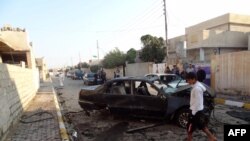Iraqi officials say multiple bombings targeting Shi'ite pilgrims have killed at least 41 people.
The largest attack Thursday happened in al-Sadiya, north of Baghdad, where a suicide bomber killed at least 32 people and wounded 75 others.
Earlier, two bombs exploded south of the capital in Hafriyah, killing at least nine people.
Both attacks hit groups of Shi'ites observing the annual Ashura ritual, which commemorates the seventh-century killing of Imam Hussein, a grandson of the Prophet Muhammad.
There was no immediate claim of responsibility for the bombings, but Sunni Muslim extremists who consider the Shi'ites heretics often target Ashura commemorations.
Sectarian tension in Iraq has risen dramatically. This year, 5,500 Iraqis have died in bombings and shootings, the most since 2008. And anti-government anger has been rising.
In the shrine city of Karbala Thursday, thousands of Shi'tes rallied to protest poor security and to call for better living conditions.
Abu Ali was one of them. "The Iraqi government does not care for people. I wonder how long this situation can go on like this,'' he said.
Iraqi lawmakers recently approved a law paving the way for a general election next April. Officials hope it could break a political deadlock and check Iraq’s dangerous slide towards sectarian war.
The largest attack Thursday happened in al-Sadiya, north of Baghdad, where a suicide bomber killed at least 32 people and wounded 75 others.
Earlier, two bombs exploded south of the capital in Hafriyah, killing at least nine people.
Both attacks hit groups of Shi'ites observing the annual Ashura ritual, which commemorates the seventh-century killing of Imam Hussein, a grandson of the Prophet Muhammad.
There was no immediate claim of responsibility for the bombings, but Sunni Muslim extremists who consider the Shi'ites heretics often target Ashura commemorations.
Sectarian tension in Iraq has risen dramatically. This year, 5,500 Iraqis have died in bombings and shootings, the most since 2008. And anti-government anger has been rising.
In the shrine city of Karbala Thursday, thousands of Shi'tes rallied to protest poor security and to call for better living conditions.
Abu Ali was one of them. "The Iraqi government does not care for people. I wonder how long this situation can go on like this,'' he said.
Iraqi lawmakers recently approved a law paving the way for a general election next April. Officials hope it could break a political deadlock and check Iraq’s dangerous slide towards sectarian war.
Some information for this report was provided by AP, AFP and Reuters.





